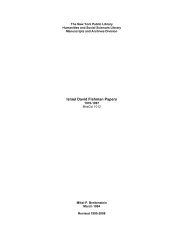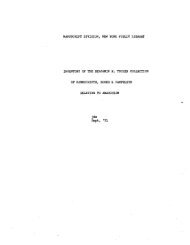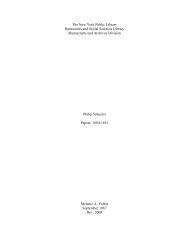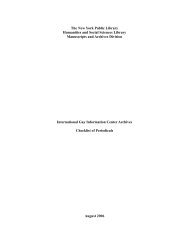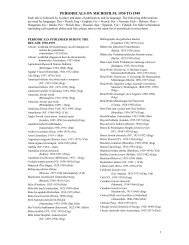pdf available - Multiple Choices
pdf available - Multiple Choices
pdf available - Multiple Choices
Create successful ePaper yourself
Turn your PDF publications into a flip-book with our unique Google optimized e-Paper software.
LIFE, RECONSTRUCTION, AND CREATIVITY 133<br />
We did not have to think long. My father was<br />
so spent, so frightened, like after a big fire, at the<br />
sudden catastrophe, that he was ready to leave the<br />
town at once. He was afraid that if he stayed one<br />
more day after mother died he would lose his<br />
children too. The question washow could he<br />
pack up the children and the few possessions,<br />
and leave the city?<br />
We could get neither horse nor wagon; and<br />
even if we could have gotten them, we had no<br />
money to pay for them. And so my father came up<br />
with a plan. Every married couple owned a chest<br />
about seven feet long, made of strong wood, and<br />
bound with iron hoops. The bottom had iron bars,<br />
screwed on with stout, heavy screws. The bars<br />
varied in length and thickness, and could serve as<br />
an axle, for they had iron wheels attached at each<br />
end. It was a primitive contraption, but it was<br />
strong. The upper part of the chest was a cover,<br />
and it had iron bars attached to it, for use either to<br />
open the chest or to keep it from closing. The<br />
cover was a bit rounded, and the chest was<br />
painted green.<br />
On either side of the chest, at the head and at<br />
the foot, were two iron handles for moving the<br />
chest from one place to another. Why do I call<br />
them the "foot" and the "head"? Because the<br />
chest was sometimes used as an extra bed. When<br />
a guest came, and we had no place to put him up,<br />
the chest became a temporary bed. During the<br />
summer, the chest held the winter clothes, for it<br />
was big enough to hold almost all of the<br />
household's goods. Some families would store<br />
their Sabbath candlesticks in the chest, or silver<br />
goblets and silver flatware, or a copper pestle and<br />
mortar, or a silver tray. The chest swallowed<br />
everything.<br />
This was done for two reasons; firstly, it had<br />
a strong lock as protection against theft; and<br />
secondly, if the copper vessels were not put<br />
away, the children used them a toys and would<br />
bang on them, making noise.<br />
My father therefore planned to use the chest<br />
as a wagon, to move our things to the village. He<br />
took off the heavy belt from his pants, attached it<br />
to one of the two handles, and put all our bags and<br />
baggage and the children into the four corners of<br />
the chest, and off we went. He yoked himself to his<br />
belt, and the chest was on its way.<br />
The village was not too far from the townwe<br />
could see the village of Vishnyeve from the<br />
railroad station. It stretched as one long street,<br />
about a mile or so long. On one side it bordered<br />
the village of Masheve, and on the other end it<br />
bordered Kotseres. It didn't take us too long to<br />
reach the village.<br />
My aunt Sosye an d my uncle Getsl Chinenzon<br />
had a big house with three large rooms. We<br />
arrived there at twilight and found a fine, large<br />
dwelling, an exception to the little low huts of the<br />
neighboring peasants. My aunt Sosye received us<br />
with heartfelt kindness.<br />
Next morning, my father found a small house<br />
near my aunt's. It was empty because many<br />
peasants had run away to Russia during the war.<br />
The house was whitewashed and cleaned; panes<br />
of glass were put into the windows and the house<br />
became spic and span.<br />
We all enjoyed the fresh air. The older children<br />
were running around, free as larks, in the<br />
gardens and the fields. Everything in the village<br />
was freereven the gardens of strangers were<br />
open to us. When I came to the village I was a weak<br />
child, for in the postwar time there was no proper<br />
food to nourish a child. We thanked God for a<br />
piece of dry bread to fill our stomachs. And so I<br />
became ill as soon as we got there, and I was sick<br />
for a long time. They fed me genilkelech (small<br />
pears), which grew not far from our new home.<br />
These small pears ripened in late autumn. Each<br />
peasant had such a pear tree on his lot. The pears<br />
or were soft, a little rotted, and sour in taste.<br />
The pear trees grew wild and abundantly in<br />
our area. No one forbade people to pick the fallen<br />
ripe pears, which were piled up even in the fields.<br />
Every peasant owned such a pear tree, which also<br />
served as a benchmark, separating his property<br />
from another's. The trees would grow tall and<br />
scatter their fruit far and wide.<br />
The term genilkelech was also the nickname<br />
of the village youth. It was a custom that village<br />
Jews of Volhynia would come to town during the<br />
holidays. Those living in distant villages brought<br />
their freezing children bundled up in bedding. The<br />
town's children would run after them yelling,<br />
"Here come the genilkes!" and throwing



